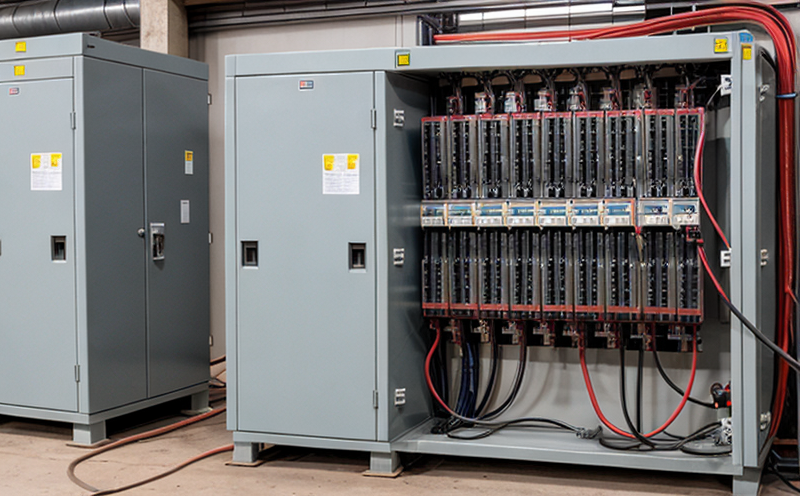IEC 62271-203 Gas-Insulated Switchgear Testing
The International Electrotechnical Commission (IEC) Standard IEC 62271-203 is an essential guideline for the testing and certification of gas-insulated switchgear, or GIS. This standard provides detailed specifications on how to conduct tests that ensure the reliability, safety, and performance of these complex electrical systems. Gas-insulated switchgear plays a crucial role in modern power distribution networks due to its high efficiency and compact design.
Gas-insulated switchgear is used in various sectors including power generation, transmission, and distribution. It minimizes the need for extensive physical space by using gas instead of oil as an insulating medium. This results in reduced maintenance requirements and enhanced safety, making it a preferred choice for many utilities. The standard IEC 62271-203 focuses on ensuring that GIS products comply with rigorous electrical, mechanical, and environmental performance criteria.
Compliance to this standard is mandatory for any manufacturer or supplier of gas-insulated switchgear intending to sell their products in markets that adhere to the IEC standards. This includes many countries across Europe, Asia, and North America. Compliance not only ensures product quality but also enhances brand reputation and facilitates easier market access.
Our laboratory specializes in providing comprehensive testing services for gas-insulated switchgear according to IEC 62271-203. Our team of experts uses state-of-the-art equipment and follows stringent protocols to ensure accurate and reliable test results. We understand the critical nature of these tests, which include high-voltage testing, insulation resistance measurement, partial discharge detection, and environmental stress qualification.
The process begins with thorough preparation of the GIS sample in accordance with specified procedures outlined in the standard. This includes cleaning, drying, and ensuring that all components are properly assembled. Following this initial phase, we conduct a series of tests designed to evaluate various aspects of the switchgear's performance.
One key test involves applying high voltage across different parts of the GIS to assess its insulation characteristics under load conditions similar to those encountered in real-world applications. Another critical test is partial discharge measurement which helps identify potential weaknesses that could lead to failures over time. Environmental stress qualification tests examine how well the switchgear withstands temperature, humidity, and other environmental factors.
Our laboratory adheres strictly to all relevant international standards including IEC 62271-203 when conducting these tests. This ensures our clients receive results that are internationally recognized and accepted by regulatory bodies worldwide. Additionally, we provide detailed reports outlining the findings from each test performed, highlighting any areas where improvements may be necessary.
By choosing our laboratory for your GIS testing needs, you can rest assured knowing that your products will meet the highest quality standards set forth by IEC 62271-203. Our experienced technicians and advanced facilities guarantee accurate results every time, helping to protect both your reputation as well as ensuring safety in usage.
Why It Matters
The importance of complying with the requirements specified by IEC 62271-203 cannot be overstated. This standard ensures that all aspects of a gas-insulated switchgear’s design, manufacturing process, and performance are thoroughly evaluated before it reaches the market. Non-compliance can result in significant financial losses due to product recalls or legal disputes over faulty equipment.
From an operational perspective, non-conforming GIS poses risks such as unplanned downtime, increased maintenance costs, and potential hazards for personnel working around them. These issues are particularly pronounced in critical infrastructure like power stations where reliability is paramount. Therefore, ensuring compliance with IEC 62271-203 helps maintain optimal performance levels while reducing operational risks.
On a broader scale, adhering to these standards fosters trust among consumers and stakeholders regarding the integrity of electrical products. It also promotes innovation within industries by setting benchmarks for quality and safety that all participants must meet. By investing in thorough testing according to IEC 62271-203, manufacturers contribute positively towards sustainable development goals associated with reducing carbon footprints through more efficient energy distribution systems.
Scope and Methodology
The scope of IEC 62271-203 encompasses a wide range of tests intended to evaluate different attributes of gas-insulated switchgear. This includes electrical performance, mechanical integrity, environmental robustness, as well as specific functional requirements tailored for various types of GIS applications.
- Electrical Performance: Testing involves assessing the ability of the GIS to withstand specified voltage levels without breakdown or arcing.
- Mechanical Integrity: Evaluations focus on ensuring that all structural elements remain intact under expected loads and stresses.
- Environmental Robustness: Experiments simulate exposure to extreme conditions such as temperature fluctuations, humidity, and pollution.
- Functional Requirements: Specific tests verify compliance with design specifications regarding functionality, control systems, and interlocking mechanisms.
The methodology employed during these assessments follows strict guidelines provided by IEC 62271-203. Each step is meticulously documented to ensure transparency and reproducibility of results. Our laboratory uses high-precision instruments calibrated against internationally recognized standards to guarantee accurate measurements throughout the entire testing process.





